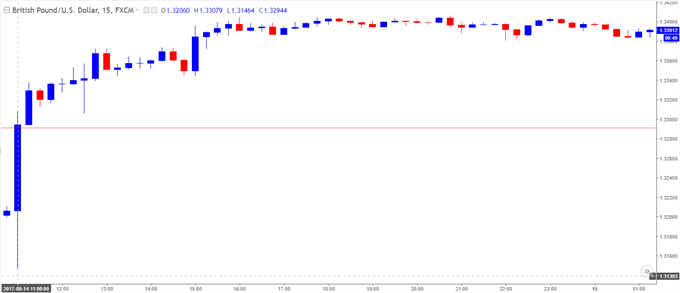Video length: 00:33:30
Trading the News: Bank of England (BoE) Interest Rate Decision

The Bank of England (BoE) interest rate decision may spark a bullish reaction in the British Pound as the central bank is anticipated to deliver its first rate-hike since 2006.
A material shift in policy should heighten the appeal of Sterling as the BoE finally moves away from its easing-cycle, and GBP/USD may exhibit a more bullish behavior over the coming months if the Monetary Policy Committee (MPC) shows a greater willingness to implement additional rate-hikes over the coming months.
However, the fresh updates coming out of the BoE may rattle to the near-term resilience in the pound-dollar exchange rate should Governor Mark Carney and Co. endorse a wait-and-see approach for 2018, with the British Pound at risk of facing a kneejerk reaction if the central bank implements a one-time rise in borrowing costs.
Impact that the Bank of England (BoE) rate decision has had on GBP/USD during the last meeting
|
Period |
Data Released |
Estimate |
Actual |
Pips Change (1 Hour post event ) |
Pips Change (End of Day post event) |
|
SEP 2017 |
09/14/2017 011:00:00 GMT |
0.25% |
0.25% |
+130 |
+190 |
September 2017 Bank of England (BoE) Interest Rate Decision
GBP/USD 15-Minute

The Bank of England (BoE) voted 7-2 to keep the benchmark interest rate the record-low, but went onto say that ‘recent developments suggest that remaining spare capacity in the economy is being absorbed a little more rapidly than expected at the time of the August Report, and that inflation remains likely to overshoot the 2% target over the next three years.’ The fresh comments suggest the Monetary Policy Committee (MPC) may alter the monetary policy outlook at the next quarterly meeting as the central bank ‘will undertake a full assessment of recent developments in the context of its November Inflation Report and accompanying economic projections,’ and Governor Mark Carney and Co. may start to normalize monetary policy ahead of 2018 as all ‘members continue to judge that, if the economy follows a path broadly consistent with the August Inflation Report central projection, then monetary policy could need to be tightened by a somewhat greater extent over the forecast period than current market expectations.’

